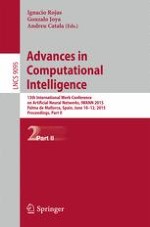2015 | OriginalPaper | Buchkapitel
Energy Flux Range Classification by Using a Dynamic Window Autoregressive Model
verfasst von : Pedro Antonio Gutiérrez, Juan Carlos Fernández, Mária Pérez-Ortiz, Laura Cornejo-Bueno, Enrique Alexandre-Cortizo, Sancho Salcedo-Sanz, Cesar Hervás-Martínez
Erschienen in: Advances in Computational Intelligence
Aktivieren Sie unsere intelligente Suche, um passende Fachinhalte oder Patente zu finden.
Wählen Sie Textabschnitte aus um mit Künstlicher Intelligenz passenden Patente zu finden. powered by
Markieren Sie Textabschnitte, um KI-gestützt weitere passende Inhalte zu finden. powered by
This paper tackles marine energy prediction from the classification point of view, by previously discretising the real objective variable into a set of consecutive categories or ranges. Given that the range of energy flux is enough to obtain an approximation of the amount of energy produced, the purpose of this discretisation is to simplify the prediction task. A special kind of autoregressive models are considered, where the category to be predicted depends on both the previous values of energy flux and a set of meteorological variables estimated by numerical models. Apart from this, this paper introduces two different ways of adjusting the order of the autoregressive models, one based on nested cross-validation and the other one based on a dynamic window. The results show that these kind of models are able to predict the time series in an acceptable way, and that the dynamic window procedure leads to the best accuracy without needing the additional computational cost of adjusting the order of the model.
